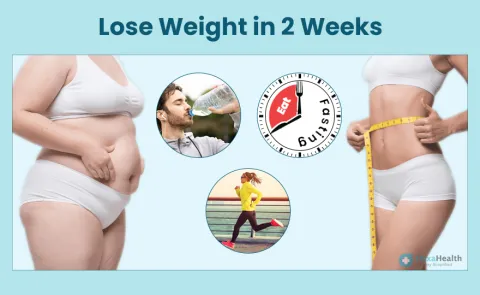Losing weight doesn’t always require the traditional route of intense workouts or restrictive diets.
While exercise and healthy eating play key roles in a balanced lifestyle, there are alternative ways to shed pounds without the need for strict calorie-counting or strenuous gym sessions.
Here are several simple yet effective strategies to help you lose weight without focusing on diet or exercise.
1. Mindful Eating
One of the most powerful tools for weight loss is becoming more mindful of how and when you eat. Mindful eating involves paying attention to your hunger and fullness cues, eating slowly, and savoring each bite. This practice can prevent overeating and help you develop a healthier relationship with food.
- How to practice mindful eating:
- Eat without distractions like your phone or TV.
- Chew your food thoroughly before swallowing.
- Pause halfway through your meal to check in with your hunger levels.
- Focus on enjoying the flavors and textures of your food.
2. Get Enough Sleep
Sleep is often overlooked when it comes to weight management, but it’s essential for balancing hormones that regulate appetite and metabolism. Lack of sleep can lead to increased hunger and cravings, especially for high-calorie foods.
- Tips for better sleep:
- Stick to a regular sleep schedule.
- Create a relaxing bedtime routine, such as reading or meditating.
- Avoid caffeine and heavy meals late in the day.
- Keep your sleep environment cool and dark.
3. Stay Hydrated
Drinking enough water throughout the day can help control hunger and improve metabolism. Often, feelings of hunger are mistaken for dehydration. Staying hydrated can help you feel full and reduce unnecessary snacking.
- Hydration tips:
- Drink a glass of water before meals to help control your appetite.
- Carry a water bottle with you to ensure you stay hydrated.
- Infuse water with natural flavors like lemon, mint, or cucumber for variety.
4. Manage Stress
Chronic stress can lead to emotional eating and increased cravings for unhealthy foods. High stress levels trigger the production of cortisol, a hormone that can promote fat storage, particularly around the belly. Managing stress through relaxation techniques can help reduce these effects.
- Stress management techniques:
- Practice deep breathing exercises.
- Try mindfulness or meditation.
- Engage in calming activities like journaling or taking a warm bath.
- Take time for hobbies or activities that bring you joy.
5. Increase Daily Movement
While intense exercise may not be necessary, increasing your daily movement can contribute to weight loss. Simple activities like walking, taking the stairs, or doing light stretching throughout the day can add up and help you burn more calories.
- Ways to increase daily movement:
- Take short walks after meals.
- Stand up and stretch every hour.
- Use a standing desk if possible.
- Play active games or engage in fun outdoor activities.
6. Eat More Fiber-Rich Foods
Fiber is essential for digestive health and can help you feel fuller for longer. Foods rich in fiber, like fruits, vegetables, legumes, and whole grains, can curb hunger and prevent overeating, making it easier to lose weight without needing to follow a strict diet.
- High-fiber foods to include:
- Leafy greens, such as spinach and kale.
- Berries, apples, and pears.
- Beans, lentils, and chickpeas.
- Whole grains like oats, quinoa, and brown rice.
7. Limit Liquid Calories
Liquid calories, like sugary drinks, juices, and specialty coffees, can add up quickly without providing any nutritional value. These beverages can lead to weight gain without leaving you feeling satisfied. Opting for water, herbal teas, or black coffee can help you avoid unnecessary calories.
- Liquid calorie swaps:
- Choose water or sparkling water over sodas.
- Drink unsweetened tea or coffee.
- Limit or eliminate high-calorie alcoholic beverages.
8. Portion Control
Without needing to count calories, simply being aware of portion sizes can help with weight loss. Using smaller plates, bowls, and utensils can make your portions appear larger, which may help prevent overeating. Paying attention to serving sizes can naturally reduce calorie intake.
- Portion control tips:
- Use smaller dishes for meals.
- Fill half your plate with vegetables.
- Avoid eating directly from large packages or containers.
- Listen to your body’s hunger and fullness signals.
9. Increase Your NEAT (Non-Exercise Activity Thermogenesis)
NEAT refers to the energy you burn from activities that aren’t formal exercise, such as fidgeting, cleaning, or walking around. Increasing NEAT throughout the day can significantly boost your calorie expenditure without structured exercise.
- Ways to increase NEAT:
- Take breaks to move or stretch while working.
- Do light household chores.
- Park farther away from your destination to encourage walking.
10. Build Healthy Habits Gradually
Making small, sustainable changes over time is often more effective than trying to make drastic changes all at once. Focus on developing healthy habits that you can stick to long-term. Gradual changes will help prevent feelings of deprivation and make weight loss feel more manageable.
- How to build healthy habits:
- Start by adding one new healthy habit each week.
- Be patient with yourself and allow time for the changes to stick.
- Track your progress to stay motivated.
Final Thoughts
Losing weight doesn’t always have to involve rigorous dieting or intense exercise routines. By focusing on mindful eating, getting enough sleep, staying hydrated, managing stress, and incorporating simple changes to your daily routine, you can gradually lose weight in a sustainable and healthy way. Remember, the key is to make small, consistent adjustments to your lifestyle that you can maintain in the long term.




